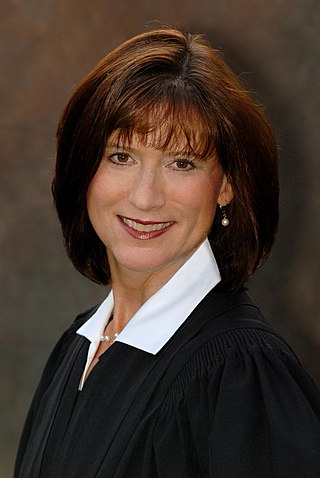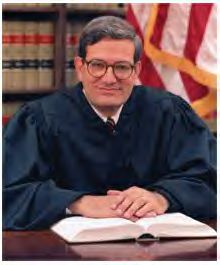
Frank Hoover Easterbrook is an American lawyer and jurist who has served as a United States circuit judge of the U.S. Court of Appeals for the Seventh Circuit since 1985. He was the Seventh Circuit's chief judge from 2006 to 2013.
The Nonintercourse Act is the collective name given to six statutes passed by the United States Congress in 1790, 1793, 1796, 1799, 1802, and 1834 to set boundaries of American Indian reservations. The various acts were also intended to regulate commerce between White Americans and citizens of Indigenous nations. The most notable provisions of the act regulate the inalienability of aboriginal title in the United States, a continuing source of litigation for almost 200 years. The prohibition on purchases of Indian lands without the approval of the federal government has its origins in the Royal Proclamation of 1763 and the Confederation Congress Proclamation of 1783.

William Holcombe Pryor Jr. is an American lawyer who has served as the chief judge of the United States Court of Appeals for the Eleventh Circuit since 2020. He was appointed as a United States circuit judge of the court by President George W. Bush in 2004. He is a former commissioner of the United States Sentencing Commission. Previously, he was the attorney general of Alabama, from 1997 to 2004.

Diane Schwerm Sykes is an American jurist and lawyer who serves as the chief judge of the U.S. Court of Appeals for the Seventh Circuit. She served as a justice of the Wisconsin Supreme Court from 1999 to 2004.
Forsyth County, Georgia v. The Nationalist Movement, 505 U.S. 123 (1992), was a case in which the United States Supreme Court limited the ability of local governments to charge fees for the use of public places for private activities. By a 5–4 vote, the court ruled that an ordinance allowing the local government to set varying fees for different events violated the First Amendment due to the lack of "narrowly drawn, reasonable, and definite standards" governing the amount of the fee.

José Alberto Cabranes is an American lawyer who serves as a senior United States circuit judge of the United States Court of Appeals for the Second Circuit and a former presiding judge of the United States Foreign Intelligence Surveillance Court of Review ("FISCR"). Formerly a practicing lawyer, government official, and law teacher, he was the first Puerto Rican appointed to a federal judgeship in the continental United States (1979).
Dennis Jacobs is a senior United States circuit judge of the United States Court of Appeals for the Second Circuit.
Spectrum Sports, Inc. v. McQuillan, 506 U.S. 447 (1993), was a case in which the Supreme Court of the United States rejected the assertion that attempted monopolization may be proven merely by demonstration of unfair or predatory conduct. Instead, conduct of a single firm could be held to be unlawful attempted monopolization only when it actually monopolized or dangerously threatened to do so. Thus, the Court rejected the conclusion that injury to competition could be presumed to follow from certain conduct. The causal link must be demonstrated.
United States v. General Electric Co., 272 U.S. 476 (1926), is a decision of the United States Supreme Court holding that a patentee who has granted a single license to a competitor to manufacture the patented product may lawfully fix the price at which the licensee may sell the product.
Tax protesters in the United States advance a number of constitutional arguments asserting that the imposition, assessment and collection of the federal income tax violates the United States Constitution. These kinds of arguments, though related to, are distinguished from statutory and administrative arguments, which presuppose the constitutionality of the income tax, as well as from general conspiracy arguments, which are based upon the proposition that the three branches of the federal government are involved together in a deliberate, on-going campaign of deception for the purpose of defrauding individuals or entities of their wealth or profits. Although constitutional challenges to U.S. tax laws are frequently directed towards the validity and effect of the Sixteenth Amendment, assertions that the income tax violates various other provisions of the Constitution have been made as well.
Inwood Laboratories Inc. v. Ives Laboratories, Inc., 456 U.S. 844 (1982), is a United States Supreme Court case, in which the Court confirmed the application of and set out a test for contributory trademark liability under § 32 of the Lanham Act.

Mashpee Tribe v. New Seabury Corp., 592 F.2d 575, was the first litigation of the Nonintercourse Act to go to a jury. After a 40-day trial, the jury decided that the Mashpee Tribe was not a "tribe" at several of the relevant dates for the litigation, and the United States Court of Appeals for the First Circuit upheld that determination.
Meyer v. Grant, 486 U.S. 414 (1988), was an important decision by the United States Supreme Court on paid petition circulation. Colorado was one of several states with a process for citizens to propose initiatives for the ballot, which if passed became law. One of the requirements was to get the signatures of a significant number of registered Colorado electors. Colorado prohibited initiative sponsors from paying for the circulation of these petitions. The state argued this was necessary to "protect[...] the integrity of the initiative."
Hoffman Estates v. The Flipside, Hoffman Estates, Inc., 455 U.S. 489 (1982), is a United States Supreme Court decision concerning the vagueness and overbreadth doctrines as they apply to restrictions on commercial speech. The justices unanimously upheld an ordinance passed by a Chicago suburb that imposed licensing requirements on the sale of drug paraphernalia by a local record store. Their decision overturned the Seventh Circuit Court of Appeals.
Kachalsky v. Cacace is a case regarding the constitutionality of "may-issue" concealed carry laws. The plaintiffs, Alan Kachalsky, Christina Nikolov, and the Second Amendment Foundation, represented by Alan Gura, originally sought an injunction barring Susan Cacace, handgun licensing authority for co-Defendant Westchester County, New York, from enforcing a requirement of New York State law that applicants for handgun carry permits demonstrate "proper cause" for the issuance of a handgun license and subsequent carry of a handgun in public.

Veeck v. Southern Bldg. Code Congress Int'l, Inc., 293 F.3d 791, was a 2002 en banc 9-6 decision of the United States Court of Appeals for the Fifth Circuit, about the scope of copyright protection for building codes and by implication other privately drafted laws adopted by states and municipal governments. A three-fifths majority of the court's fifteen judges held that copyright protection no longer applied to model codes once they were enacted into law.
Reed v. Town of Gilbert, 576 U.S. 155 (2015), is a case in which the United States Supreme Court clarified when municipalities may impose content-based restrictions on signage. The case also clarified the level of constitutional scrutiny that should be applied to content-based restrictions on speech. In 2005, Gilbert, Arizona adopted a municipal sign ordinance that regulated the manner in which signs could be displayed in public areas. The ordinance imposed stricter limitations on signs advertising religious services than signs that displayed "political" or "ideological" messages. When the town's Sign Code compliance manager cited a local church for violating the ordinance, the church filed a lawsuit in which they argued the town's sign regulations violated its First Amendment right to the freedom of speech.
The Mercoid cases—Mercoid Corp. v. Mid-Continent Investment Co., 320 U.S. 661 (1944), and Mercoid Corp. v. Minneapolis-Honeywell Regulator Co., 320 U.S. 680 (1944)—are 1944 patent tie-in misuse and antitrust decisions of the United States Supreme Court. These companion cases are said to have reached the "high-water mark of the patent misuse doctrine." The Court substantially limited the contributory infringement doctrine by holding unlawful tie-ins of "non-staple" unpatented articles that were specially adapted only for use in practicing a patent, and the Court observed: "The result of this decision, together with those which have preceded it, is to limit substantially the doctrine of contributory infringement. What residuum may be left we need not stop to consider." The Court also suggested that an attempt to extend the reach of a patent beyond its claims could or would violate the antitrust laws: "The legality of any attempt to bring unpatented goods within the protection of the patent is measured by the antitrust laws, not by the patent law."
Arlington County Board v. Richards, 434 U.S. 5 (1977), is a United States Supreme Court decision on the application of the Equal Protection Clause of the Fourteenth Amendment to the Constitution to municipal parking restrictions. In a unanimous per curiam opinion, the Court held that a residential zoned parking system requiring permits for daytime parking in the Aurora Highlands neighborhood of Arlington County, Virginia, with those permits limited to residents, their guests and those who came to their homes for business purposes had a rational basis and was thus constitutional. Its decision overturned the Virginia Supreme Court.






